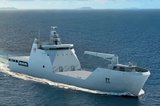Philippines orders six OPVs from South Korea
The original HDP-1500 Neo OPV design from Hyundai Heavy Industries has been enlarged into a 2,400t OPV for the Philippine Navy, as shown here. (HHI)
The Philippine Navy (PN) will be getting six OPVs from Hyundai Heavy Industries (HHI) in South Korea, after Manila signed a KRW744.9 billion ($579.2 million) contract on 27 June.
Among the dignitaries attending the ceremony at the Philippine Department of National Defense in Manila were Defense Secretary Delfin Lorenzana, and Sam-Hyun Ka, President of Korea Shipbuilding and Offshore Engineering. The latter is the parent company of HHI.
Shephard reported last month that the PN’s technical working group had already settled on HHI’s offering. Furthermore, the Department of Budget and Management released an initial 10% of funds for the acquisition on
Already have an account? Log in
Want to keep reading this article?
More from Naval Warfare
-
![Turkey targets Italian market with strategic partnership on USVs and hybrid platforms]()
Turkey targets Italian market with strategic partnership on USVs and hybrid platforms
Havelsan, VN Maritime and Piloda Defence will collaborate to develop and integrate a range of maritime solutions with a view to secure a first procurement contract in Italy in the first half of this year.
-
![US Coast Guard’s Arctic Security Cutter ramp-up signifies turning point in Polar operations]()
US Coast Guard’s Arctic Security Cutter ramp-up signifies turning point in Polar operations
The USCG recently announced the award of a contract to Davie Defense for the supply of five ASCs, marking a major step in the acquisition programme as the US grows its presence in the Arctic.
-
![UK ‘Hybrid Navy’ steps up as Norway cooperation reinforces Arctic strategy]()
UK ‘Hybrid Navy’ steps up as Norway cooperation reinforces Arctic strategy
As Russia commits billions to new warships and stealth submarines, the UK is reshaping its strategy with expanded troop deployments, shared frigate fleets and a shift towards uncrewed platforms.





















